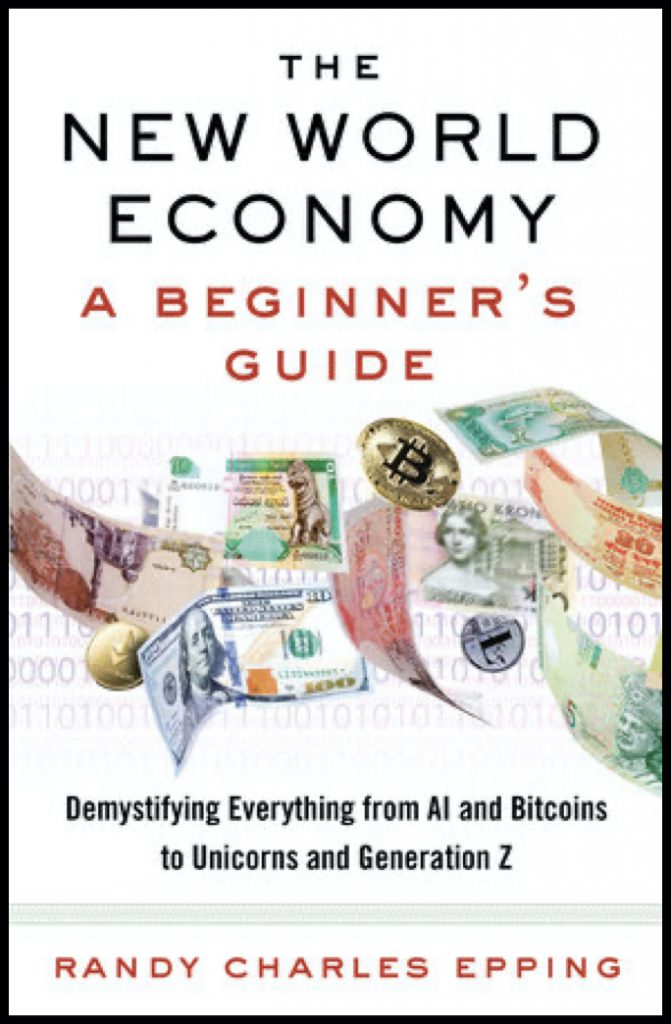The New World Economy: A Beginner’s Guide; Demystifying Everything from AI to Bitcoins to Unicorns and Generation Z (by Randy Charles Epping, 2020, Vintage), promises to be a beginner’s guide in the sense that it defines or clarifies a set frequently used words and concepts, which are part of the current discourse about world economy. (terms like: trade wars, isolationism, digital economy, sharing economy, blockchains, cryptocurrencies, etc.). The proliferation of these terms is happening at pace that is difficult to keep up with. The book isn’t only about new terminology. It also covers older concepts, such as investment, venture capital, hedge funds, and hot money. You might find the book useful if you’d like to learn about and review these concepts against the larger landscape of current world economy.
The book consists of thirty-six short chapters, each addressing a topic or question. A small sample of chapter titles: Chapter 9 is called, “How Do Populist Leaders Use Our Economic Illiteracy to Gain Power?”, Chapter 10: “Globalization—Problem or Solution?”, Chapter 20: “What Is the Internet of Things?”, Chapter 21: “Is Data the New Gold?” The topics covered in different chapters relate to each other and, indeed, a major task of the book is to show how everything is interconnected. Thus, to understand economics, even at this quite superficial level, it is impossible to avoid addressing politics, international relations, the populist movements in different parts of the world, and the on-going battles over democracy, just as it is impossible to avoid technology, artificial intelligence, new ways of being connected, new ways of working, investing, learning, and sharing, all enabled by technological development. The book succeeds in showing the dizzying interconnectedness of our (economic) lives with so many other factors; it also succeeds in highlighting the movement/change that is going on in the world (among these changes is the growing economic inequality among segments of societies); the book also does a fine job at introducing a set of core concepts and showing how to think with them.
The limitation of the book, aside from its upfront superficiality (which shouldn’t be criticized, since it is called, “A Beginner’s Guide”), is that the author frames the discussion in terms of his own stance on major issues, e.g., with regard to politics, economics, and international relations. This is a limitation because the reader will learn only how, for instance, a concept like globalism is used by someone who is in favor of it, and not by a critic of globalism (we could extend this to other topics, free trade, neoliberalism, and immigration). In general, the meaning of a concept that is at the center of a debate is adequately grasped only when we see how people on different sides of a debate understand the concept. In this sense, the book isn’t just superficial, but also slightly biased in its presentation.
Now, a few words about why I decided to read the book. With my academic background in psychology, learning in other topics is highly inefficient (it costs me more time and energy to learn a little economics, compared to the relatively lower cost that could go into learning something new in psychology), but there is an important reason to study other disciplines. If you learn a little psychology, a little politics, a little economics, a little literary theory, you will notice the ideas that can travel across these domains. Equally important is noticing ideas that do not travel across these domains. My interest in psychology becomes narrower when I learn a little politics. Why would I remain concerned with parts of psychology that are only relevant and interesting to specialist areas within psychology? Why would I be concerned about parts of psychology that don’t travel out of psychology? My wife recently described this is by saying that we remain grounded if we maintain reference to multiple disciplines (grounded in the common ground that is shared by the disciplines). Thus, even if you follow my content for reasons related to psychology, I’d encourage you to join me in occasionally going out of our way to read an introductory book about some other topic. If nothing else, it could renew and narrow down your interest in your main area (in my case, psychology).
My final criticism of this book is that it doesn’t provide a list of recommended readings. That is reasonable to expect that from “A Beginner’s Guide”. One book that might offer a balancing perspective to Epping’s book is called “The End of Free Market” (by Ian Bremmer, 2010), which I have just started reading. Though it is slightly dated, it is written with more sophistication and I’m enjoying it so far. My next review might be of Bremmer’s book.
Note: The link to the book is an Amazon affiliate link, which means I’ll receive a small commission from a qualified purchase, with no additional cost to you.
